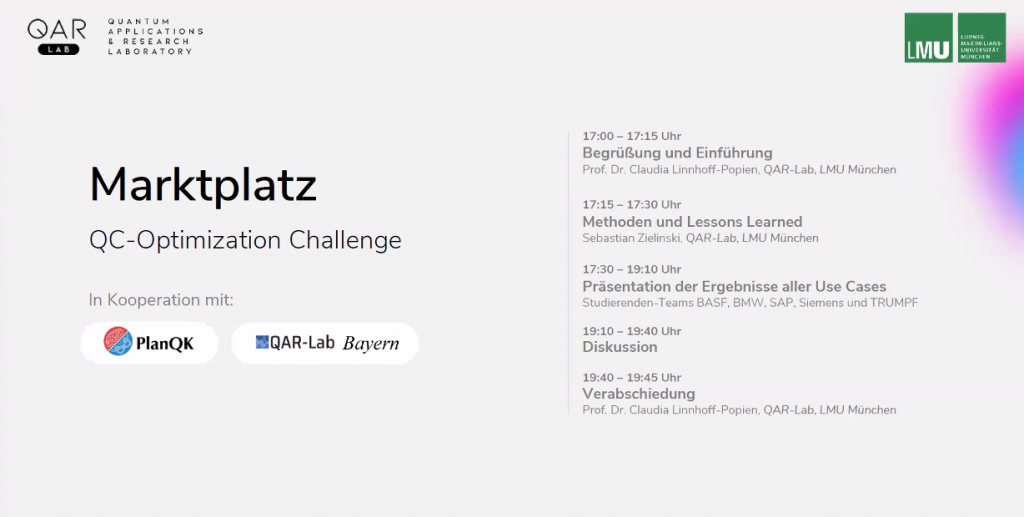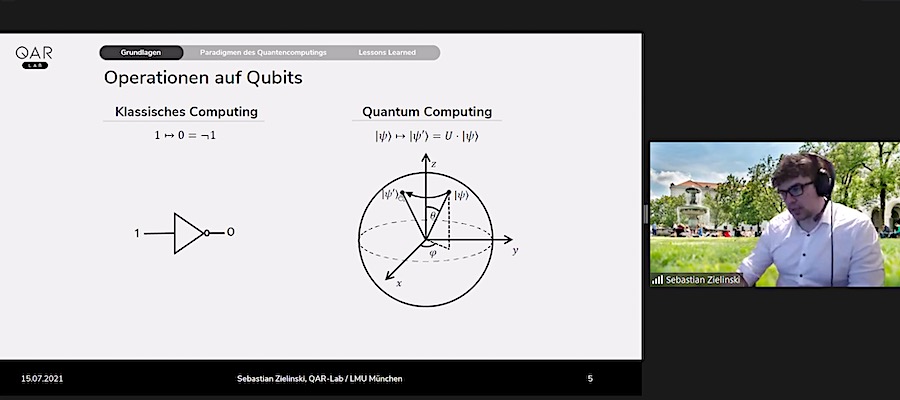QAR-Lab presents results of the “Quantum Computing Optimization Challenge” with BASF, BMW, SAP, Siemens and Trumpf
QAR-Lab presents results of the "Quantum Computing Optimization Challenge" with BASF, BMW, SAP, Siemens and Trumpf
(July 26, 2021/Munich) After a three-month programming challenge of the Quantum Applications & Research Lab (QAR-Lab) with five use cases of big German corporations on four quantum computers each, one of the most extensive European tests of the worldwide existing quantum technology ended in July.

Under the lead of Prof. Dr. Claudia Linnhoff-Popien and her research team of the QAR-Lab, 27 students calculated real use cases from the companies BASF, BMW, SAP, Siemens and Trumpf on quantum computers. Each use case was programmed on four computers to achieve the optimal result in each case. The computers used were:
In the three-hour final presentation, participants presented their results obtained in these 20 constellations. The closed event had 50 participants.
Chair holder Claudia Linnhoff-Popien reported on the complex framework conditions that the QAR Lab had to resolve beforehand, in order to enable LMU students to use various real quantum computers. With costs of 41,000 Euros, a long legal run-up, and a challenging familiarization on the part of the scientific supervisors with the use of these computers, this had been the most elaborate practical course in the history of the chair. Claudia Linnhoff-Popien was pleased: “No one in Germany offers students such opportunities to experience quantum computing. We are at the forefront worldwide – I am very proud of that.”
Founded in 2016, the QAR-Lab aims to make quantum computing accessible to a wide range of users in research and industry at a low threshold. It is continuously dedicated to new projects that build a bridge between science and industry.
Over the course of „Quantum Computing Optimization Challenge“ project, researchers gained different insights, with particular emphasis on performance, noise, and user experience findings when accessing the quantum computing hardware used. A detailed comparison of the results depending on the use case took place and forecasts were made for the development of the respective systems. With the four computers used, a broad coverage of the currently available quantum hardware was achieved, even across architectures with gate-model and annealing-based computers.

Presentation of “Methods and Lessons Learned” during the closing event of the QC-Challenge by Sebastian Zielinski
Initial findings of the programming challenge were: Small instances of real-world industrial use cases can already be solved using quantum computers.
However, the quality of the solutions obtained depends on numerous factors. All quantum computer solution methods have a large number of parameters, the setting of which has a great influence on the solution finding. However, finding the ideal parameter values is time-consuming and cost-intensive due to a lack of empirical values. The response times are also subject to large fluctuations. Depending on the time of day, the utilization of the machines and thus the response time of the quantum computers varies. A period of time ranging from a few seconds to numerous hours can pass before one receives a response from a quantum computer.
Due to a lack of standardization in hardware access, the various groups had to familiarize themselves with the respective proprietary software development kits (SDK) of the different quantum computers. As a result, problems arising at different points had to be solved individually. The last finding provides a starting point for own basic research in the area of standardization of access technologies or for software tools that abstract a certain complexity when solving use cases with quantum computers and thus simplify the solution finding process.
Experts from the QAR Lab are optimistic that the economy will have a quantum advantage in five to ten years. Then quantum computers will solve tasks that are completely impossible with conventional computers or will be able to do so immensely faster and for greater complexity.
The conclusion of the challenge
In a few years, when quantum technology has the necessary power to solve real industrial problems, tools and algorithms developed by the QAR Lab, as well as practical trained experts, will already be prepared. With their know-how, they will enable industry to use quantum computing immediately. Besides this, the QAR-Lab already makes an immense contribution in the training of future quantum computing experts through such practically relevant events.

